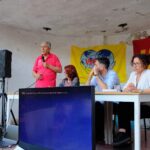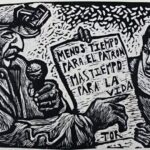In 2022, the International Trade Union Confederation (ITUC) -that slanderous parody of a trade union organization, historically tied to bloody dictatorships in our continent and complicit for decades in the imperialist offensive against the Venezuelan people and, more broadly, against all the peoples of the world—organized its 4th World Women’s Conference. Among the decisions made by this international hub of reactionary trade unionism, one stands out in particular: its tactical approach toward women in the trade union movement:
“As experiences in several countries show, awareness-raising, advocacy and campaigning and building strategic alliances with civil society organizations, feminist movements and women’s rights organizations are instrumental for unions to make progress on ratification [of C190 and R206].”¹
Similar declarations were made during the 3rd World Women’s Conference of the ITUC/Women’s Organising Assembly (2017), which from the outset proclaimed its programmatic and strategic understanding of the issue:
“The 3rd ITUC World Women’s Conference/Women’s Organising Assembly brings together women trade unionists from around the world to claim our rights and realize gender equality through building workers’ power based firmly on the principles of feminism and solidarity.”²
We will not delve into the ITUC’s one-dimensional agenda, which, in order to conceal the class roots of women’s inequality, narrows contemporary working women’s struggle to the mere ratification of ILO Convention 190, apparently with the intent of leaving capitalism—the system that generates and reproduces multifaceted violence against our working-class sisters—off the hook. As if ending violence against working women could magically occur without halting the source of the greatest violence: the violence of the capitalists who steal the surplus value we produce! It is also telling that in both quoted texts, the word capitalism does not appear even once!
More significantly, however, is how the social democrats make use of the accommodating term “feminism” to divert working women’s struggle toward partial and limited questions of political equality, hiding the fact that true women’s emancipation can only become a reality in a society free of exploitation.
1. On the use of the term “feminism”
Thus, bearing these considerations in mind—conclusions our class-oriented trade union movement has reached through years of conflict and ideological struggle—we are not surprised to find them scattered throughout texts of that “classless” unionism. What does draw our special attention is having recently encountered them in a text sent by LAB! Specifically, the self-proclaimed “Coordinadora de los Pueblos” [Peoples’ Coordination] in a text submitted by the Basque organization LAB to the WFTU Women’s Committee in January 2025, levies unfair and baseless criticisms against the WFTU, alleging that it should deepen its “feminist” conception. More precisely, it states:
“Despite the path already taken and the evident advances, also within the WFTU, we believe we must continue deepening the construction of a feminist, internationalist, transversal and class-oriented trade unionism, one that puts the demands of working women at the center and combats all forms of violence and discrimination in the world of work. The world of work should be a safe space for all women, free from sexist violence and discrimination.”
On the surface, the language may seem well-intentioned, but in reality it conceals a confrontation and a set of ideas against which the class-oriented union movement has fought for over 110 years! But what did the great revolutionary Alexandra Kollontai write regarding the clash with feminists in her 1913 article for International Women’s Day?
“What do feminists want? The advantages, power, and rights in capitalist society that their husbands, fathers, and brothers now have.
What do working women want? The elimination of any advantage based on birth or wealth. The working woman doesn’t care whether this ‘master’s power’ is given to a man or a woman. Together with the rest of her class, she can alleviate her condition as a worker.
Feminists demand equality always and everywhere. The working women reply: we demand rights for all citizens, but we won’t let them forget that we are not only workers and citizens—we are mothers! And as mothers, as women who bear the future, we demand special care for ourselves and our children, special protection from the state and society.
Feminists seek political rights. But here too, the paths diverge.
For bourgeois women, political rights are just a way to feel more comfortable and secure in a world built on the exploitation of workers. For working women, it is a step on that rocky and difficult path leading to the longed-for realm of labor.”³
Kollontai’s text—warning about the true aims of bourgeois feminism—feels as though it were written yesterday. It illustrates the enduring differences between the women of our class and their exploiters, among whom are the women of the bourgeoisie. A chasm separates the modern working woman, with her complex problems, from those faced by bourgeois women. Recent political experience in our region clearly demonstrates this: for example, the recent attack on the Bolivian people by anti-communist dictator Jeanine Áñez; the current assault on Peru’s working class by Dina Boluarte; or the harmful role of María Corina Machado in the service of the U.S. imperialism, in its dispute against Maduro’s tyranny in Venezuela—all are being led by bourgeois women! The experiences in the U.S. with Condoleezza Rice and in Germany with Angela Merkel, two imperialist hawks, tell the same story.
Therefore, the claim for “feminist trade unionism” by the comrades of LAB—no matter how many militant adjectives adorn it—does not mask the danger of such social democratic concepts to our movement. Such a line creates an artificial opposition between male and female workers, divides the working class, and ultimately weakens its united front against the bourgeoisie. Furthermore, the LAB comrades seem to fall into the “original social democratic sin” in their text: overlooking the fact that for this so-called “safe space” in the world of work to exist, the rotten capitalist world must be completely demolished.
After all, history’s signs point in this direction. As comrade George Mavrikos stated:
“The socialist societies that were built during the 20th century laid the foundation, through the socialization of the means of production, for the promotion of women’s equality. Women achieved full rights in employment, motherhood, education, housing, sports, health, and politics.”⁴
Likewise, the WFTU, in its most recent congress document titled “Rome Declaration”, is crystal clear on this, without conceding to a certain classless “feminism”:
“We educate our members and leadership cadres to fight together, women and men, against socioeconomic exploitation.”⁵
This wording, reflecting the accumulated experience of the workers’ movement, leaves no room for misinterpretation. The common enemy is capitalism, and therefore, the struggle of those who comprise the class destined to overthrow it is also common.
2. On “Nationalist Trade Unionism”
The Basque comrades identify as “left-wing” nationalists. Such a conception, present in an organization affiliated with the WFTU, cannot help but raise concern within our Federation’s internationalist family—especially in times when capital is increasingly militarizing the economy, and tariffs and so-called “protectionist” practices in international trade are reemerging with force, particularly after the election of Trump in the United States.
Naturally, the evolution of politics and the economy must not leave the trade union movement indifferent. We see it in Latin America, for example, with the ultra-reactionary Milei in Argentina and with Maduro’s false “revolutionary patriotism” in Venezuela. The same is true across the Atlantic. The election of leaders such as Meloni in Italy, Orbán in Hungary, the rise of AfD in Germany, etc., and the growing influence of various forms of “nationalism” should sound the alarm for the working class. Especially because phrases like “sovereign nations” are being adopted by xenophobic bourgeois parties in the European Parliament, such as “Europe of Sovereign Nations” led by Éric Zemmour and AfD.
Particularly concerning for the unity and prestige of the WFTU is the use of titles like “Trade Unions of Stateless Nations”⁶…
So here too, no matter how many cosmetic adjectives are placed in front of “nationalism,” the working class must not remove its class lenses for a moment or play into the hands of the bourgeoisie. The class line must always take precedence over the national. Anyone who forgets this will inevitably find themselves trapped in the dead end of nationalism and, either overtly or subtly, becoming hostile to their class brothers and sisters in other states. As Lenin also pointed out:
“The bourgeoisie always places its national demands at the forefront. And it does so unconditionally. The proletariat subordinates them to the interests of the class struggle.”⁷
In conclusion, it is of particular importance to defend the class identity of the WFTU, especially at a time when the class current of the trade union movement appears weakened in the face of reactionary trade unionism and social democracy, with the international balance of forces against us. The text submitted by LAB to the WFTU Women’s Committee, under the name of a supposed “Coordinadora de los Pueblos,” may well have been written with the best of intentions—but the artificial divisions it erects within the working class, consciously or unconsciously, have historically proven to be especially harmful. Whether related to nation and people or to gender, they objectively divide and undermine the united front of the working class and weaken the class unity we especially need today more than ever.
As Lenin noted:
“This program only demands that the truly socialist party shall not corrupt proletarian consciousness, shall not obscure the class struggle, shall not mislead the working class with bourgeois democratic phrases, shall not violate the unity of the current political struggle of the proletariat. In this condition—the only one under which we accept self-determination—lies the essence of the issue.”⁸
This is the line the WFTU has attempted to follow for 80 years, and it is the duty of all of us to highlight this rich historical path. At the same time, as we commemorate the 80th WFTU anniversary, we must sharpen our focus on the phenomena of nationalism, which in Europe and around the world are sowing division, hatred, and hostility among peoples.
Yes to the right of self-determination, under the safe umbrella of class priority.
3. On LAB’s Support for the Government of Nicolás Maduro
The critical matters raised here are topics for a necessary debate within our WFTU. That is why, in line with the already stated principle of class priority, we must also address LAB’s unconditional support—and that of some other organizations affiliated with the WFTU—for the government of Nicolás Maduro and the social-democratic PSUV, while remaining silent and turning their backs on the denunciations made by Venezuela’s class-oriented trade unionism regarding the policies of labor rights destruction and anti-union repression that the so-called “workers’ government” applies with cruelty.
It is alarming that union leaders who wrap themselves in the glorious banners of the WFTU visit Venezuela to pay homage to Nicolás Maduro and his ruling clique (as LAB has done), yet do not listen to the demands of Venezuelan workers, who are being punished through the elimination of wages and collective bargaining agreements, the confiscation of labor gains won through years of struggle, the banning of union freedoms and the imprisonment of worker leaders, the judicial assault on the Communist Party and other political and social organizations of the revolutionary left—all of this carried out by the governing elite, which wields its total control over all public powers to suppress democratic freedoms, just as the CUTV has described.⁹
In our firm view, class-oriented union leaders must, at the same time as we oppose the aggressive and criminal interference of U.S. imperialism and its allies in Venezuela’s affairs, also reject the neoliberal policies through which the government places the weight of the capitalist crisis and the imperialist sanctions on the already worn shoulders of the working class, while shamelessly subsidizing the financial and import bourgeoisie. Solidarity must not be with the oppressors, but with the oppressed.
Pedro Eusse
Secretary General of the
Central Unitaria de Trabajadores de Venezuela (CUTV)
Caracas, April 2025
References
-
https://www.ituc-csi.org/IMG/pdf/booklet_womens_organising_assembly_en.pdf
-
https://progressive.international/wire/2022-03-08-womens-day-february-1913/ru
-
https://theoryandpraxis.eu/wp-content/uploads/2023/03/6_16speechesesp.pdf
-
https://uitbb.org/wp-content/uploads/2022/05/2022_5_4_DECLARACION-DE-ROMA_ESP.pdf
-
https://www.marxists.org/espanol/lenin/obras/1910s/derech.htm
-
https://www.marxists.org/espanol/lenin/obras/oe12/lenin-obrasescogidas02-12.pdf




















